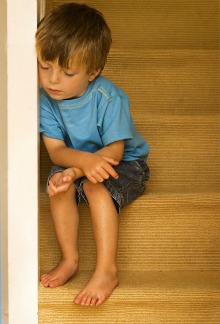Talking to children about death is never easy. Often, we don't think about doing it until a close relative dies. Some families try to protect children by 'softening' the reality of death, an approach which experts agree can do more harm than good. Here, Carol Lee draws on her own experiences following the death of her children's father, Andy.
Carol Lee on children's experiences of grief
There is no doubt that the death of a parent or someone close to a child will have a major impact on their young lives, and as adults we often feel at a loss as to how to support and soothe them through their grief. When my children’s father died I worried that their hearts would be irrevocably broken and that they would be forever damaged by the experience. Now nearly 7 years later they are happy, healthy and well adjusted. With the help of the other adults in their lives, they have been able to work through their feelings of loss and move on. 
One of the most important things I have learnt was that research shows that grief not only affects our minds and emotions but that we also feel the pain in our bodies. When we form attachments as young children, ‘feel good’ chemicals are released in the body, these attachments or bonds are reinforced over and over again by physical closeness and day to day caring. If this attachment is then broken the body and mind experiences a withdrawal from those ‘feel good’ chemicals and this can be felt in the body as tension, depression, pain, heaviness and aggression.
As children struggle to understand how someone they need and love could die and leave them, it is not surprising that as well as sadness, normal grief reactions for children include, anger and angry outbursts, anxiety separation, withdrawal, tantrums, aggression to others and themselves, clinginess and regression.
The sadness of grief which underpins all of the above behaviours can feel heavy, deep and prolonged, like a general malaise that dampens the whole experience of life. On the other hand grief can flash in and out for intensely painful moments when there are little reminders that someone special has died.
"Try and use factual words like died and death rather than softer words"
Children tend to dip in and out of sad feelings; they are naturally optimistic and full of life and so may not dwell on feeling sad. This can sometimes be disconcerting for the adults around them who are feeling overwhelmed with a mixture of feelings about death and how best to support the child. Children may also feel inclined to hide their feeling or swallow back tears for fear of upsetting others. It is important that children are encouraged to honestly express how they feel so they can express their sadness when they feel sad and not to feel bad when they don’t.
Messages you may want to give about feeling sad include;
- It is normal to feel sad when someone we loves dies
- We feel sad because we miss that person very much
- Sadness can be felt in the mind and the body, we may feel strange aches and pains in our body and think we hear or see that person.
- Sadness can sometimes make us feel cross and angry and to lose interest in things that used to make us happy
- Although we will never forget the person who has died, the sadness will feel less as time goes by as we learn to go on living without that person.
- Sadness can come and go and sometimes it surprises us as it seems to pop up out of nowhere
- It is okay to feel sad and it is okay not to feel sad
- It is okay to laugh and carry on enjoying life, this is what being alive is all about.
Anger and aggression can feel particularly hard to deal with and it is important to help children find healthy, safe ways to express this. Ways they could do this may include;
- Punching a pillow or cushion
- Scribbling or drawing in a particular colour or in an ‘angry’ book
- Physical activity, such as running, bouncing on a trampoline or kicking a ball
- As well as the above and depending on the age of the child it may be appropriate to explain that their anger is because of their sadness.
To find out more about how you can support your child following a bereavement please see my Top Tips on Supporting a Child Who is Grieving.

Carol Lee has written two books aimed at 5-9 year olds, 'Saying Goodbye to Hare' and 'Remembering Hare'. They were written after Carol helped her two sons, then aged seven and nine, cope with the illness and death of their father, Andy, who died a year and a day after being diagnosed with cancer. A great resource to support adults to help children understand the concepts of death and dying.


